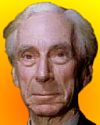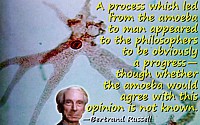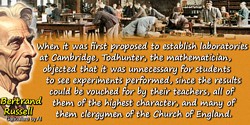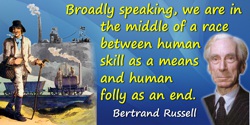 (source)
(source)
|
Bertrand Russell
(18 May 1872 - 2 Feb 1970)
Welsh mathematician, logician and philosopher known for his work in mathematical logic, but was also active in social and political campaigns, advocating pacifism and nuclear disarmament.
|
Bertrand Russell Quotes on Mind (9 quotes)
>> Click for 189 Science Quotes by Bertrand Russell
>> Click for Bertrand Russell Quotes on | Achievement | Aristotle | Arithmetic | Belief | Certainty | Difference | Error | Fact | Knowledge | Law | Life | Logic | Mathematics | Method | Mistake | Observation | Philosopher | Philosophy | Power | Science | Science And Religion | Scientific Method | Truth |
>> Click for 189 Science Quotes by Bertrand Russell
>> Click for Bertrand Russell Quotes on | Achievement | Aristotle | Arithmetic | Belief | Certainty | Difference | Error | Fact | Knowledge | Law | Life | Logic | Mathematics | Method | Mistake | Observation | Philosopher | Philosophy | Power | Science | Science And Religion | Scientific Method | Truth |
I think it would be just to say the most essential characteristic of mind is memory, using this word in its broadest sense to include every influence of past experience on present reactions.
— Bertrand Russell
In Portraits from Memory: and Other Essays (1956), 143.
I wanted certainty in the kind of way in which people want religious faith. I thought that certainty is more likely to be found in mathematics than elsewhere. But I discovered that many mathematical demonstrations, which my teachers expected me to accept, were full of fallacies, and that, if certainty were indeed discoverable in mathematics, it would be in a new field of mathematics, with more solid foundations than those that had hitherto been thought secure. But as the work proceeded, I was continually reminded of the fable about the elephant and the tortoise. Having constructed an elephant upon which the mathematical world could rest, I found the elephant tottering, and proceeded to construct a tortoise to keep the elephant from falling. But the tortoise was no more secure than the elephant, and after some twenty years of very arduous toil, I came to the conclusion that there was nothing more that I could do in the way of making mathematical knowledge indubitable.
— Bertrand Russell
In 'Reflections on my Eightieth Birthday', Portraits from Memory (1956), 54.
If I were to suggest that between the Earth and Mars there is a china teapot revolving about the sun in an elliptical orbit, nobody would be able to disprove my assertion provided I were careful to add that the teapot is too small to be revealed even by our most powerful telescopes. But if I were to go on to say that, since my assertion cannot be disproved, it is intolerable presumption on the part of human reason to doubt it, I should rightly be thought to be talking nonsense. If, however, the existence of such a teapot were affirmed in ancient books, taught as the sacred truth every Sunday, and instilled into the minds of children at school, hesitation to believe in its existence would become a mark of eccentricity and entitle the doubter to the attentions of the psychiatrist in an enlightened age or of the Inquisitor in an earlier time.
— Bertrand Russell
In unpublished manuscript, 'Is There a God', (5 Mar 1952) written for the magazine, Illustrated. Collected in Bertrand Russell, John G. Slater (ed.) and Peter Köllner (ed.) The Collected Papers of Bertran Russell: Volume II: Last Philosophical Testament: 1943-68 (1997), 547-548.
In attempting to understand the elements out of which mental phenomena are compounded, it is of the greatest importance to remember that from the protozoa to man there is nowhere a very wide gap either in structure or in behaviour. From this fact it is a highly probable inference that there is also nowhere a very wide mental gap.
— Bertrand Russell
Lecture II, 'Instinct and Habit', The Analysis of Mind
Of these austerer virtues the love of truth is the chief, and in mathematics, more than elsewhere, the love of truth may find encouragement for waning faith. Every great study is not only an end in itself, but also a means of creating and sustaining a lofty habit of mind; and this purpose should be kept always in view throughout the teaching and learning of mathematics.
— Bertrand Russell
Essay, 'The Study of Mathematics' (1902), collected in Philosophical Essays (1910), 73-74. Also collected in Mysticism and Logic: And Other Essays (1919), 73.
The scientific attitude of mind involves a sweeping away of all other desires in the interest of the desire to know.
— Bertrand Russell
Mysticism and Logic: And Other Essays (1919), 44.
To a mind of sufficient intellectual power, the whole of mathematics would appear trivial, as trivial as the statement that a four-footed animal is an animal. (1959)
— Bertrand Russell
My Philosophical Development (1995), 207.
We are … led to a somewhat vague distinction between what we may call “hard” data and “soft” data. This distinction is a matter of degree, and must not be pressed; but if not taken too seriously it may help to make the situation clear. I mean by “hard” data those which resist the solvent influence of critical reflection, and by “soft” data those which, under the operation of this process, become to our minds more or less doubtful.
— Bertrand Russell
Our Knowledge of the External World (1925), 75.
What is best in mathematics deserves not merely to be learnt as a task, but to assimilated as a part of daily thought, and brought again and again before the mind with ever-renewed encouragement.
— Bertrand Russell
Essay, 'The Study of Mathematics' (1902), collected in Philosophical Essays (1910), 73-74. Also collected in Mysticism and Logic: And Other Essays (1919), 60.
See also:
- 18 May - short biography, births, deaths and events on date of Russell's birth.
- Bertrand Russell - context of quote “A process which led from the amoeba to man” - Medium image (500 x 350 px)
- Bertrand Russell - context of quote “A process which led from the amoeba to man” - Large image (800 x 600 px)



 In science it often happens that scientists say, 'You know that's a really good argument; my position is mistaken,' and then they would actually change their minds and you never hear that old view from them again. They really do it. It doesn't happen as often as it should, because scientists are human and change is sometimes painful. But it happens every day. I cannot recall the last time something like that happened in politics or religion.
(1987) --
In science it often happens that scientists say, 'You know that's a really good argument; my position is mistaken,' and then they would actually change their minds and you never hear that old view from them again. They really do it. It doesn't happen as often as it should, because scientists are human and change is sometimes painful. But it happens every day. I cannot recall the last time something like that happened in politics or religion.
(1987) -- 


